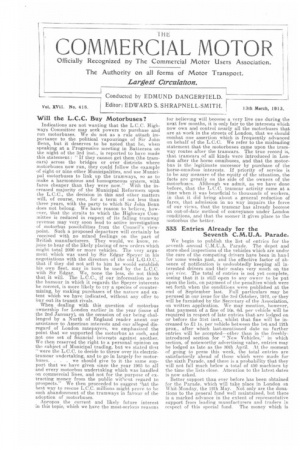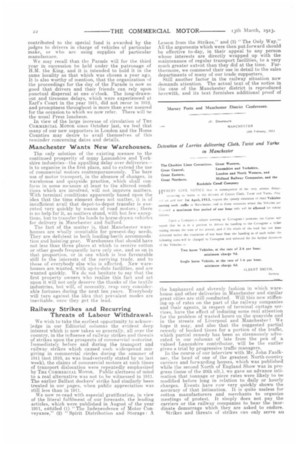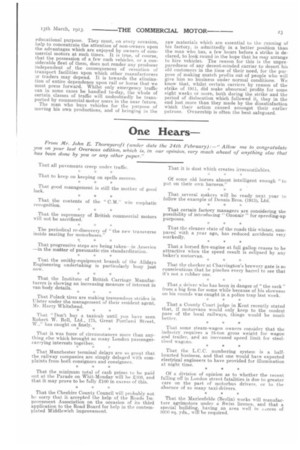Will the L.C.C. Buy Motorbuses?
Page 1

Page 2

Page 3

If you've noticed an error in this article please click here to report it so we can fix it.
Indications are not wanting that the L.C.C. Highways Committee may seek powers to purchase and run motorbuses. We do not as a rule attach importance to the political vapourings of Sir John 13enn, but it deserves to be noted that he, when speaking at a Progressive meeting in Battersea on the night of the 3rd inst., is reported to have made this statement : If they cannot get them (the tramcars) across the bridges or over districts where motorbuses now run, they could follow the example of eight or nine other Municipalities, and use Municipal motorbuses to link up the tramways, so as to make a harmonious and homogeneous system, with fares cheaper than they were now." With the increased majority of the Municipal Reformers upon the L.C.C., the decision in this and other matters will, of course, rest, for a term of not less than three years, with the party to which Sir John Benn does not belong. We have reason to believe, however, that the straits to which the Highways Committee is reduced in respect of its falling tramway revenue may very soon lead to active investigation of motorbus possibilities from the Council's viewpoint. Such a proposed departure will certainly be received with no mixed feelings on the part of British manufacturers. They would, we know, rejoice to hear of the likely placing of new orders which might total 2000 or more vehicles. The very argument which was used by Sir Edgar Speyer in his negotiations with the directors of the old L.G.O.C., that if they did not sell to him he would establish his own fleet, may in turn be used by the L.C.C. with Sir Edgar. We, none the less, do not think that it will. The L.C.C., if our information as to the humour in which it regards the Speyer interests be correct, is more likely to try a species of countermining, by making purchases of the nature and extent which we have indicated, without any offer to buy out its transit rivals.
When dealing with this question of motorbus ownership for London earlier in the year (issue of • the 2nd January), on the occasion of our being challenged by a North of England reader anent our assistance to American interests and our alleged disregard of London ratepayers, we emphasized the point that we supported the motorbus as such, and not one set of financial interests against another. We then reserved the right to a personal opinion on the subject of Municipal trading, but we stated that "were the L.C.C. to decide to throw over its electrictramcar undertaking, and to go in largely for motorbuses. . . . we should give to it the same support that we have given since the year 1905 to all and every motorbus undertaking which was handled on commercial lines, and not for the purpose of extracting money from the public without regard to prospects." We then proceeded to suggest at the best way to rescue L.C.C. millions might prove to be such abandonment of the tramways in favour of the adoption of motorbuses.
Aeropos the current and likely future interest in this topic, which we have the most-serious reasons
for believing will become a very live one during the next few months, it is only fair to the interests which now own and control nearly all the motorbuses that are at work in the streets of London, that we should combat one assertion which is frequently advanced on behalf of the L.C.C. We refer to the misleading statement that the motorbuses came upon the tramway routes after the tramcars. The true record is, that tramcars of all kinds were introduced in London after the horse omnibuses, and that the motorbus is the legitimate successor by purchase of the horse-omnibus interests. If priority of service is to be any measure of the equity of the situation, the facts are greatly on the side of the owners of the motorbuses. Although we admit, as we have done before, that the L.C.C. tramcar activity came at a time when it was beneficial to thousands of workers, in that it did bring about a general reduction of fares, that admission in no way impairs the force of our views, that the tramcar has already become an out-of-date method of conveyance under London conditions, and that the sooner it gives place to the luotorbus the better.
333 Entries Already for the
Seventh C.M.U.A. Parade.
We begin to publish the list of entries for the seventh annual C.M.U.A. Parade. The depot and store-shed inspections of the vehicles which are undsr the care of the competing drivers have been in han.I for some weeks past, and the effective factor of absence of notification is undoubtedly keeping all interested drivers and their mates very much on the qui vive. The total of entries is not yet complete, seeing that it is still open to any owner to be put upon the lists, on payment of the penalties which were set forth when the conditions were published at the end of September last. Full particulars may be perused in our issue for the 3rd October, 1912, or they will be furnished by the Secretary of the Association, on written application. We may mention, however, that payment of a fine of 10s. ad. per vehicle will be required in respect of late entries that are lodged on or before the 31st inst., whilst that fine will be increased to El is. per vehicle between the 1st and 12th prox., after which last-mentioned date no further entries will be accepted—other than in the freshlyintroduced section for " New Vehicles," in which section, of noteworthy advertising value, entries may be lodged as late as the 30th April. At the moment of going to press this week, the total entries are satisfactorily ahead of those winch were made for the sixth Parade, and there is a probability that they will not fall much below a total of 450 machines by the time the lists close. Attention to the latest dates is now asked.
Better support than ever before has been obtained for the Parade, which will take place in London on Whit-Monday. the 12th May. Not only are the donations to the general fund well maintained, but there is a marked advance in the extent of representative support from leading manufacturers and traders in respect of this special fund. The money which is contributed to the special fund is awarded by the judges to drivers in charge of vehicles of particular make, or who are using supplies of particular manufacture.
We may recall that the Parade will for the third year in succession be held under the patronage of H.M. the King, and it is intended to hold it in the same locality as that which was chosen a year ago. it is also worthy of mention, that the organization ef the proceedings for the day of the Parade is now so good that drivers and their friends can rely upon punctual dispersal at one o'clock. The long-drawnout and tiresome delays, which were experienced at Earl's Court in the year 1911, did not recur in 11)12, and promptness throughout is more than ever assured for the occasion to which we now refer. There will be the usual Press luncheon.
In view of the large increase of circulation of THE COMMERCIAL MOTOR since October last, we feel that many of our new supporters in London and the Home Counties may desire to avail themselves of this reminder concerning dates and details.
Manchester Wants New Warehouses.
The only solution of the existing menace to the continued prosperity of many Lancashire and Yorkshire industries—the appalling delay over deliveries— is to organize in the first place, and to extend the use of commercial motors contemporaneously. The bare use of motor transport, in the absence of changes. in warehouse and quayside practice, which shall conform in some measure at least to the altered conditions which are involved, will not improve matters. With terminal conditions apparently based upon the idea that the time element does not matter, it is of insufficient avail that depot-to-depot transfer is executed very quickly by means of road motors ; there is no help for it, as matters stand, with but few exceptions, but to transfer the loads to horse-drawn vehicles for delivery in Manchester and Salford.
The fact of the matter is, that Manchester warehouses are wholly unsuitable for present-day veeds. They are deficient in both loading-berth accommodation and hoisting gear. Warehouses that should have not less than three places at which to receive cotton or other goods frequently have only one, and so on in that proportion, or in one which is less favourable still to the interests of the carrying trade, and to those of everybody else who is affected. New warehouses are wanted, with up-to-date facilities, and are wanted quickly. We do not hesitate to say that the first property owners who realize this fact and act upon it will not only deserve the thanks of the textile industries, but will, of necessity, reap very considerable fortunes during the next ten years. Everybody will turn against the idea that prevalent modes are inevitable, once they get the lead.
Railway Strikes and Recurring Threats of Labour Withdrawal.
We wish to take the earliest opportunity to acknowledge in our Editorial columns the evident deep interest which is now taken so generally, all over the country, in the influence of railway strikes and threats of strikes upon the prospects of commercial motoring. Immediately before and during the transport and railway i strikes which caused such widespread misgiving n commercial circles during the summer of 1911 (not 1910, as was inadvertently stated by us last week), the claims of commercial motors at such times of transport dislocation were repeatedly emphasized by THE COMMERCIAL MOTOR. Public alertness of mind to a real alternative was not to be witnessed in 1911. The earlier Belfast dockers' strike had similarly been treated in our pages, when public appreciation was still less than in 1911.
We now re-read with especial gratification, in view of the literal fulfilment of our forecasts, the leading articles, which were published in August of the year 1911, entitled (1) "The Independence of Motor Conveyance," (2) "Spirit Distribution and Storage : A
Lesson from the strikes," and (3) "The Only Way." All the arguments which were then put forward should be effective to-day, in their appeal to any person whose interests are directly wrapped up with the maintenance of regular transport facilities, to a very much greater extent than they did at the time. Furthermore, we commend their use in detail to the sales departments of many of our trade supporters. Still another factor in the railway situation now demands attention. The actual text of the notice in the case of the Manchester district is reproduced herewith, and its text furnishes additional proof of the haphazard and slovenly fashion in which warehouse and other deliveries in Manchester and similar great cities are still conducted. Will this new stiffening-up of rates on the part of the railway companies and their agents, in respect of terminal cartage services, have the effect of inducing some real attention for the problem of wasted hours on the quayside and in the streets of Liverpool and Manchester ? We hope it may. and also that the suggested partial remedy of booked times for a portion of the traffic, which partial remedy has been so strenuously advocated in our columns of late from the pen of a valued Lancashire contributor, will be the earlier given a trial by progressive traffic managers.
Iii the course of our interview with Mr. John Faulkner, the head of one of the greatest North-country carriers and forwarding houses, which was published while the second North of England Show was in progress (issue of the 20th ult.). we gave an advance intimation that tonnage or piece rates were likely to be modified before long in relation to daily or hourly charges. Events have now very quickly shown the accuracy of that intimation. It is quite useless for cotton manufacturers and merchants to organize meetings of protest. It simply does not pay the carriers or the railway companies to bear the inordinate demurrage which they are asked to endure.
Strikes and threats of strikes can only serve an educational purpose. They must, on every occasion, help to concentrate the attention of non-owners upon the advantages which are enjoyed by owners of commercial motors at such times. It is true, of course, that the possession of a few such vehicles, or a considerable fleet of them, does not render any producer independent of the consequences of cessation of transport facilities upon which other manufacturers Dr traders may depend. It is towards the elimination of entire dependence upon rail or horse that we must press forward. Whilst only emergency traffic can in some cases be handled to-day, the whole of certain classes of traffic will undoubtedly be transported by commercial-motor users in the near future.
The man who buys vehicles for the purpose of moving his own productions, and of bringing in the raw materials which are essential to the running of his factory, is admittedly in a better position than the man who has, a few hours before a strike is declared, to look round in the hope that he may arrange to hire vehicles. The reason for this is the unpreparedness of any decent-minded carrier to desert his old customers in the time of their need, for the purpose of making snatch profits out of people who will give him no business under normal conditions. We know that, whilst certain carriers by reason of the strike of 1911, did make abnormal profits for some eight weeks or more, both during the strike and the period of dislocation which followed it, they in the end lost more than they made by the dissatisfaction which their action caused amongst their earlier patrons. Ownership is often the best safeguard.
























